外研版必修4Module 3 Body Language and Non-Verbal Communication Reading and Vocabulary Grammar课件(共25张PPT)
文档属性
| 名称 | 外研版必修4Module 3 Body Language and Non-Verbal Communication Reading and Vocabulary Grammar课件(共25张PPT) |
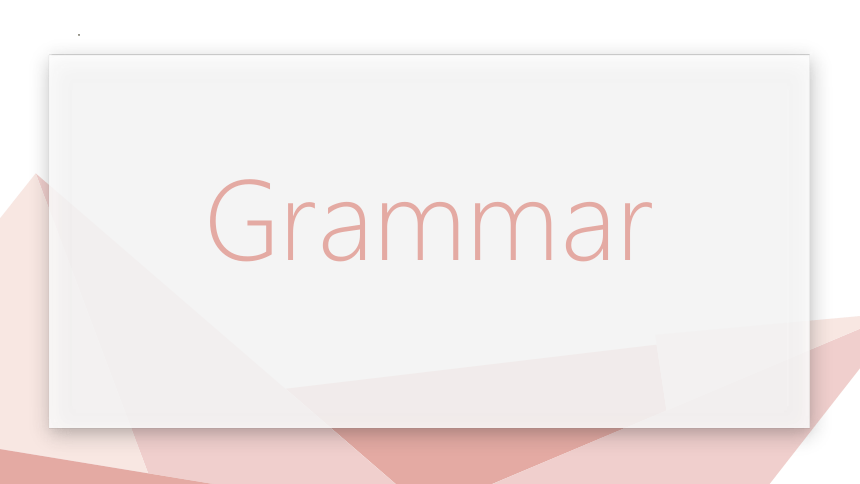
|
|
| 格式 | pptx | ||
| 文件大小 | 638.0KB | ||
| 资源类型 | 教案 | ||
| 版本资源 | 外研版 | ||
| 科目 | 英语 | ||
| 更新时间 | 2023-02-02 00:00:00 | ||
图片预览

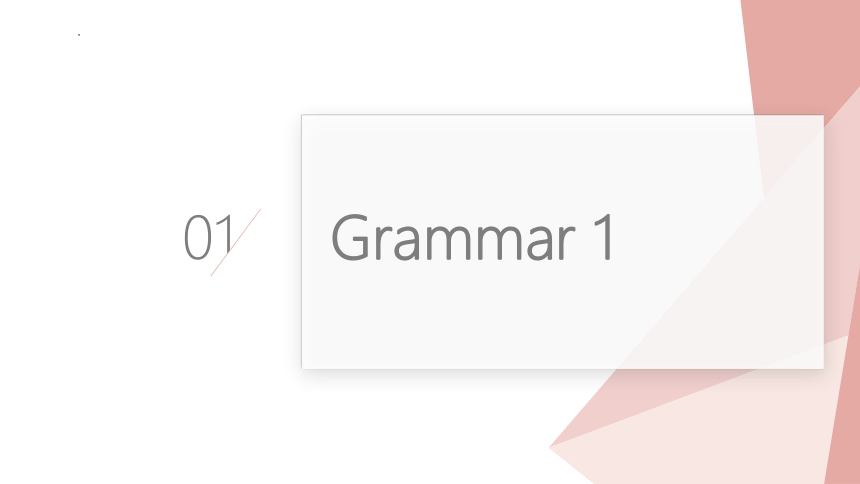

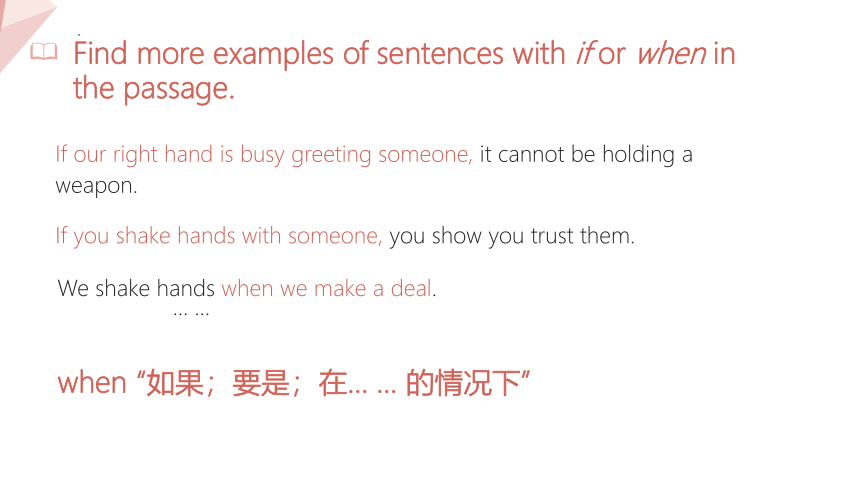
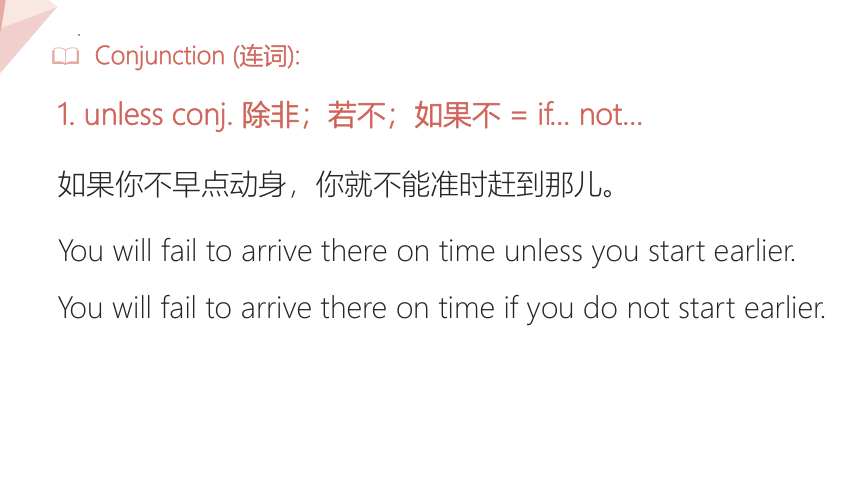
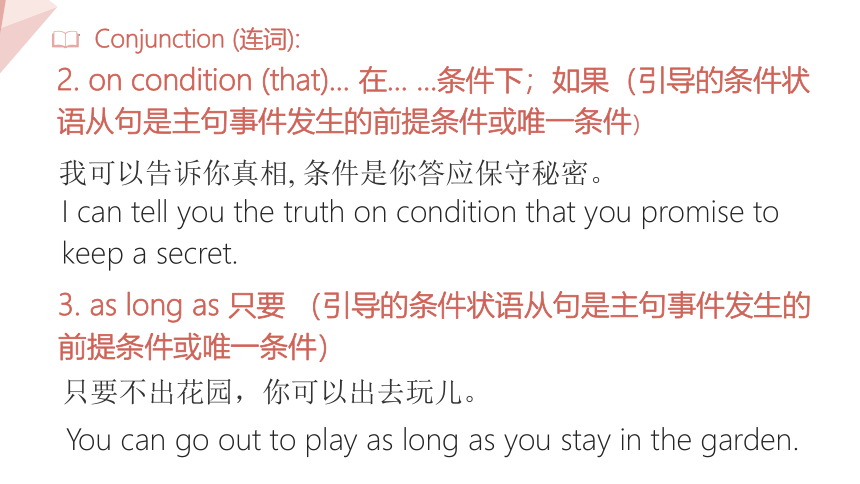
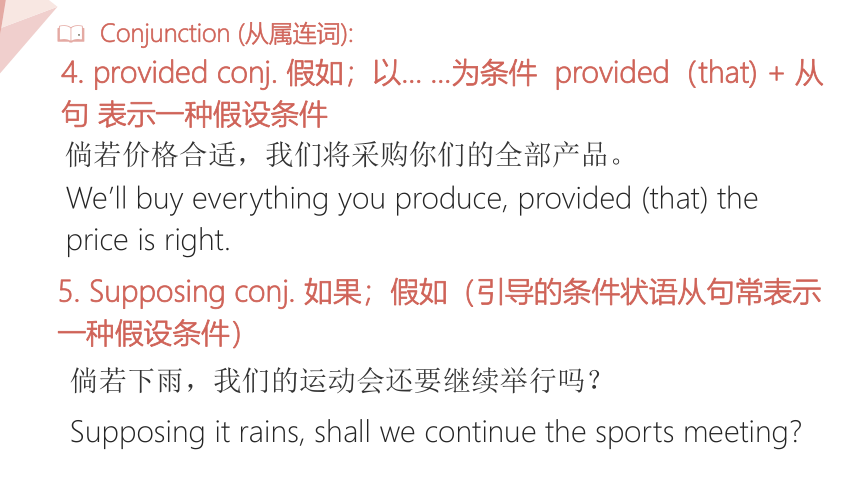
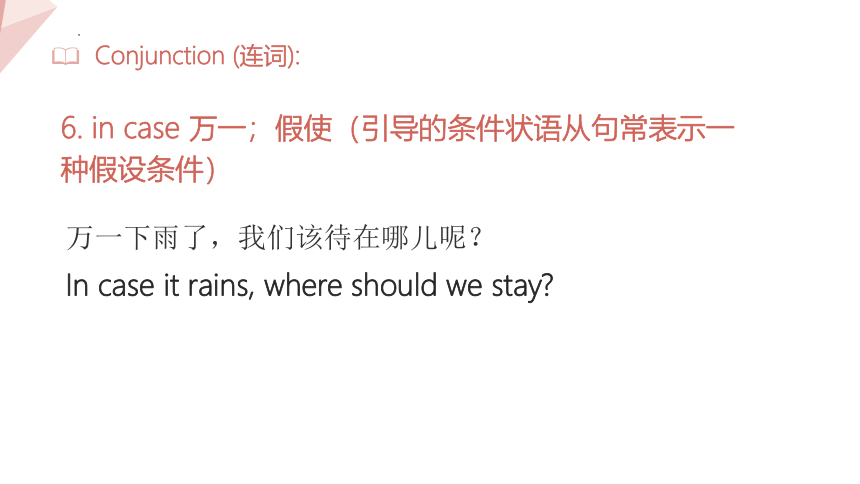
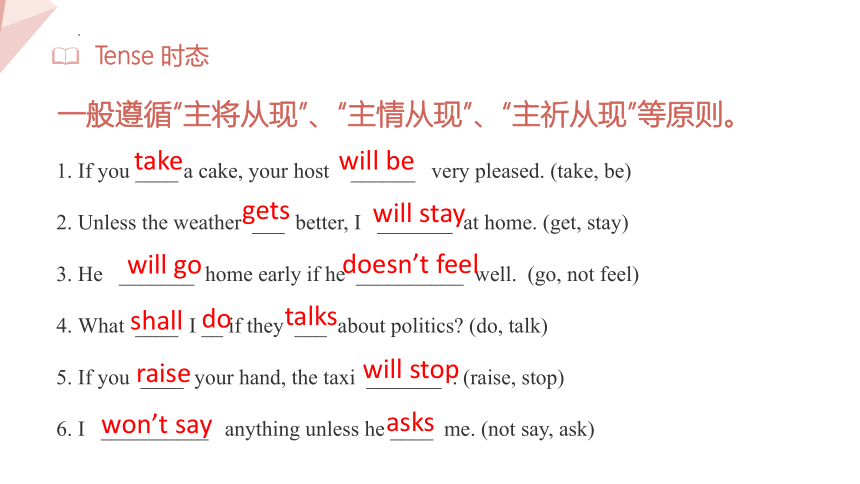
文档简介
(共25张PPT)
Grammar
01
Grammar 1
If you say the word “communication”, most people think of words and sentences.
We use “learned” body language when we are introduced to strangers.
The sentences from the passage…
Look at these sentences from the passage.
Now tick the true statements.
1 describe common situations
2 describe impossible situations
3 use if or when to introduce the situation
4 explain the result of the situation in the other part of the sentence
5 use the present simple tense in both parts of the sentence
Adverbial clause of condition
条件状语从句
条件是指某一件事情实现之后(状语从句中的动作),其他事情才能发生。
Find more examples of sentences with if or when in the passage.
If our right hand is busy greeting someone, it cannot be holding a weapon.
If you shake hands with someone, you show you trust them.
We shake hands when we make a deal.
… …
when “如果;要是;在… … 的情况下”
Conjunction (连词):
1. unless conj. 除非;若不;如果不 = if… not…
如果你不早点动身,你就不能准时赶到那儿。
You will fail to arrive there on time unless you start earlier.
You will fail to arrive there on time if you do not start earlier.
Conjunction (连词):
2. on condition (that)… 在… …条件下;如果(引导的条件状语从句是主句事件发生的前提条件或唯一条件)
我可以告诉你真相, 条件是你答应保守秘密。
I can tell you the truth on condition that you promise to keep a secret.
3. as long as 只要 (引导的条件状语从句是主句事件发生的前提条件或唯一条件)
只要不出花园,你可以出去玩儿。
You can go out to play as long as you stay in the garden.
Conjunction (从属连词):
4. provided conj. 假如;以… …为条件 provided(that) + 从句 表示一种假设条件
倘若价格合适,我们将采购你们的全部产品。
We’ll buy everything you produce, provided (that) the price is right.
5. Supposing conj. 如果;假如(引导的条件状语从句常表示一种假设条件)
倘若下雨,我们的运动会还要继续举行吗?
Supposing it rains, shall we continue the sports meeting
Conjunction (连词):
万一下雨了,我们该待在哪儿呢?
In case it rains, where should we stay
6. in case 万一;假使(引导的条件状语从句常表示一种假设条件)
Tense 时态
一般遵循“主将从现”、“主情从现”、“主祈从现”等原则。
1. If you ____ a cake, your host ______ very pleased. (take, be)
2. Unless the weather ___ better, I _______ at home. (get, stay)
3. He _______ home early if he __________ well. (go, not feel)
4. What ____ I __ if they ___ about politics (do, talk)
5. If you ____ your hand, the taxi _______ . (raise, stop)
6. I __________ anything unless he ____ me. (not say, ask)
take
will be
gets
will stay
will go
doesn’t feel
shall
do
talks
raise
will stop
won’t say
asks
条件状语从句的省略
当条件状语从句主语和主句主语一致,且从句谓语动词是be动词时,从句中的主语和be动词可以省略;当条件状语从句中包含it is 时,it is也可以省略。
Unless the machine is repaired, the machine is useless.
Unless repaired, the machine is useless.
I want to come back by 5:00 pm if it is possible.
I want to come back by 5:00 pm if possible.
还有诸如:if necessary(如果有必要),if any(如果有), if in need如果需要)。
非真实条件句
if引导的条件状语从句如果与事实不符,应用虚拟语气。
虚拟条件从句(if) 主句
与现在事实相反的假设 过去式 be----were should/would/could/
might + do
与过去事实相反的假设 had done should/would/could/
might + have done
与将来事实相反的假设 过去式(be----were) should do were to do should/would/could/
might + do
Subjunctive Mood
Exercises:
1. —Are you thinking about going to New York for the holiday
—No. But if I ________the time,I would definitely go.
A. have B. had
C. have had D. would have
2. If you ________this experiment,you will understand the theory better.
A. will be doing B. have done
C. will have done D. would do
B
B
Exercises:
3. — Shall Brown come and play computer games
— No,________ he has finished his homework.
A. when B. if C. unless D. once
4. --- How long do you think it will be ______ China sends a manned spaceship to the moon
--- Perhaps two or three years.
A. when B. until C. that D. before
C
D
Exercises:
5. Jenny was very sad over the loss of the photos she had shot at Canada, ____ this was a memory she especially treasured.
A. as B. if
C. when D. where
6. I wonder if I________ time. If I ________time,I’ll go with you.
A. have;have B. will have;will have
C. have;will have D. will have;have
A
D
02
Grammar 2
Adverbial clause of concession
让步状语从句
一般翻译为“尽管… … ”或者“即使… …”等。
Conjunction (连词):
1. "疑问词十ever"相当于"no matter+疑问词"引导的让步状语从句。
你无论借哪本书,都必须一周内归还。
Whichever/No matter which book you borrow,you must return it in a week.
注意: “no matter+疑问词”只能引导让步状语从句;而“疑问词-ever”还可以引导名词性从句
e.g. I’ll eat whatever you give me.
Whoever comes will be welcome.
Conjunction (连词):
2. though,although这两个连词用法基本一样,只是前者口语化, 后者较正式,当位于句首,都不与but连用,但可以和yet,still连用。
尽管这台电视非常贵,我仍然要买。
Although the TV set is very dear,I still buy it.
3. even if, even though这两个复合连词意义相同,常用以强调让步概念,含有退一步想的意思.
即使天气很糟糕,我们也要去旅行。
We'll make a trip even if/though the weather is bad.
Conjunction (连词):
4. as 引导的让步状语从句一般置于主句之前,须用部分倒装,此时将从句中作表语的名词、形容词,作状语的副词或谓语部分的动词原形置于句首;若表语是单数名词,前置时要省略冠词。
形容词
副词
+as+主语+谓语
名词(不带冠词)
动词(原形)
Conjunction (从属连词):
1. Although he is a child, he knows what is the right thing to do.
Child as he is, he knows what is the right thing to do.
2. Although he works hard, he makes little progress.
Hard as he works, he makes little progress.
3. Although he is young, he can read and write in several foreign languages.
Young as he is, he can read and write in several foreign languages.
4. Although you may object, I will go there.
Object as you may, I will go there.
注意:在这种倒装结构中,也可以用though,但不用although。
Conjunction (连词):
5. whether… or… 表示“不管… …还是… … “
不管你信不信,这都是真的。
Whether you believe it or not,it is true.
6. while 也可以引导让步状语从句,意为“尽管”
尽管没有太多钱,他们也过得很幸福。
While there was not a lot of money, they live a happy life.
Tense 时态
让步状语从句中,常用一般现在时。
___ he has limited technical knowledge, the old worker has a lot of experience.
A. Since B. Unless
C. As D. Although
2. How can you expect to learn anything ____ you never listen
A. while B. even if
C. unless D. when
D
D
Exercises:
3. Many of them turned a deaf ear to his advice, ____ they knew it to be valuable.
A. as if B. now that
C. even though D. so that
4. ________ I really don’t like art, I find his work impressive.
A. As B. Since
C. If D. While
C
D
5. Leave your key with a neighbor, ________ you lock yourself out one day.
A. ever since B. even if
C. soon after D. in case
6. ________, his idea was accepted by all the people at the meeting.
A. Strange as might it sound
B. As it might sound strange
C. As strange it might sound
D. Strange as it might sound
D
D
THANK YOU FOR WATCHING
Thank you!
Grammar
01
Grammar 1
If you say the word “communication”, most people think of words and sentences.
We use “learned” body language when we are introduced to strangers.
The sentences from the passage…
Look at these sentences from the passage.
Now tick the true statements.
1 describe common situations
2 describe impossible situations
3 use if or when to introduce the situation
4 explain the result of the situation in the other part of the sentence
5 use the present simple tense in both parts of the sentence
Adverbial clause of condition
条件状语从句
条件是指某一件事情实现之后(状语从句中的动作),其他事情才能发生。
Find more examples of sentences with if or when in the passage.
If our right hand is busy greeting someone, it cannot be holding a weapon.
If you shake hands with someone, you show you trust them.
We shake hands when we make a deal.
… …
when “如果;要是;在… … 的情况下”
Conjunction (连词):
1. unless conj. 除非;若不;如果不 = if… not…
如果你不早点动身,你就不能准时赶到那儿。
You will fail to arrive there on time unless you start earlier.
You will fail to arrive there on time if you do not start earlier.
Conjunction (连词):
2. on condition (that)… 在… …条件下;如果(引导的条件状语从句是主句事件发生的前提条件或唯一条件)
我可以告诉你真相, 条件是你答应保守秘密。
I can tell you the truth on condition that you promise to keep a secret.
3. as long as 只要 (引导的条件状语从句是主句事件发生的前提条件或唯一条件)
只要不出花园,你可以出去玩儿。
You can go out to play as long as you stay in the garden.
Conjunction (从属连词):
4. provided conj. 假如;以… …为条件 provided(that) + 从句 表示一种假设条件
倘若价格合适,我们将采购你们的全部产品。
We’ll buy everything you produce, provided (that) the price is right.
5. Supposing conj. 如果;假如(引导的条件状语从句常表示一种假设条件)
倘若下雨,我们的运动会还要继续举行吗?
Supposing it rains, shall we continue the sports meeting
Conjunction (连词):
万一下雨了,我们该待在哪儿呢?
In case it rains, where should we stay
6. in case 万一;假使(引导的条件状语从句常表示一种假设条件)
Tense 时态
一般遵循“主将从现”、“主情从现”、“主祈从现”等原则。
1. If you ____ a cake, your host ______ very pleased. (take, be)
2. Unless the weather ___ better, I _______ at home. (get, stay)
3. He _______ home early if he __________ well. (go, not feel)
4. What ____ I __ if they ___ about politics (do, talk)
5. If you ____ your hand, the taxi _______ . (raise, stop)
6. I __________ anything unless he ____ me. (not say, ask)
take
will be
gets
will stay
will go
doesn’t feel
shall
do
talks
raise
will stop
won’t say
asks
条件状语从句的省略
当条件状语从句主语和主句主语一致,且从句谓语动词是be动词时,从句中的主语和be动词可以省略;当条件状语从句中包含it is 时,it is也可以省略。
Unless the machine is repaired, the machine is useless.
Unless repaired, the machine is useless.
I want to come back by 5:00 pm if it is possible.
I want to come back by 5:00 pm if possible.
还有诸如:if necessary(如果有必要),if any(如果有), if in need如果需要)。
非真实条件句
if引导的条件状语从句如果与事实不符,应用虚拟语气。
虚拟条件从句(if) 主句
与现在事实相反的假设 过去式 be----were should/would/could/
might + do
与过去事实相反的假设 had done should/would/could/
might + have done
与将来事实相反的假设 过去式(be----were) should do were to do should/would/could/
might + do
Subjunctive Mood
Exercises:
1. —Are you thinking about going to New York for the holiday
—No. But if I ________the time,I would definitely go.
A. have B. had
C. have had D. would have
2. If you ________this experiment,you will understand the theory better.
A. will be doing B. have done
C. will have done D. would do
B
B
Exercises:
3. — Shall Brown come and play computer games
— No,________ he has finished his homework.
A. when B. if C. unless D. once
4. --- How long do you think it will be ______ China sends a manned spaceship to the moon
--- Perhaps two or three years.
A. when B. until C. that D. before
C
D
Exercises:
5. Jenny was very sad over the loss of the photos she had shot at Canada, ____ this was a memory she especially treasured.
A. as B. if
C. when D. where
6. I wonder if I________ time. If I ________time,I’ll go with you.
A. have;have B. will have;will have
C. have;will have D. will have;have
A
D
02
Grammar 2
Adverbial clause of concession
让步状语从句
一般翻译为“尽管… … ”或者“即使… …”等。
Conjunction (连词):
1. "疑问词十ever"相当于"no matter+疑问词"引导的让步状语从句。
你无论借哪本书,都必须一周内归还。
Whichever/No matter which book you borrow,you must return it in a week.
注意: “no matter+疑问词”只能引导让步状语从句;而“疑问词-ever”还可以引导名词性从句
e.g. I’ll eat whatever you give me.
Whoever comes will be welcome.
Conjunction (连词):
2. though,although这两个连词用法基本一样,只是前者口语化, 后者较正式,当位于句首,都不与but连用,但可以和yet,still连用。
尽管这台电视非常贵,我仍然要买。
Although the TV set is very dear,I still buy it.
3. even if, even though这两个复合连词意义相同,常用以强调让步概念,含有退一步想的意思.
即使天气很糟糕,我们也要去旅行。
We'll make a trip even if/though the weather is bad.
Conjunction (连词):
4. as 引导的让步状语从句一般置于主句之前,须用部分倒装,此时将从句中作表语的名词、形容词,作状语的副词或谓语部分的动词原形置于句首;若表语是单数名词,前置时要省略冠词。
形容词
副词
+as+主语+谓语
名词(不带冠词)
动词(原形)
Conjunction (从属连词):
1. Although he is a child, he knows what is the right thing to do.
Child as he is, he knows what is the right thing to do.
2. Although he works hard, he makes little progress.
Hard as he works, he makes little progress.
3. Although he is young, he can read and write in several foreign languages.
Young as he is, he can read and write in several foreign languages.
4. Although you may object, I will go there.
Object as you may, I will go there.
注意:在这种倒装结构中,也可以用though,但不用although。
Conjunction (连词):
5. whether… or… 表示“不管… …还是… … “
不管你信不信,这都是真的。
Whether you believe it or not,it is true.
6. while 也可以引导让步状语从句,意为“尽管”
尽管没有太多钱,他们也过得很幸福。
While there was not a lot of money, they live a happy life.
Tense 时态
让步状语从句中,常用一般现在时。
___ he has limited technical knowledge, the old worker has a lot of experience.
A. Since B. Unless
C. As D. Although
2. How can you expect to learn anything ____ you never listen
A. while B. even if
C. unless D. when
D
D
Exercises:
3. Many of them turned a deaf ear to his advice, ____ they knew it to be valuable.
A. as if B. now that
C. even though D. so that
4. ________ I really don’t like art, I find his work impressive.
A. As B. Since
C. If D. While
C
D
5. Leave your key with a neighbor, ________ you lock yourself out one day.
A. ever since B. even if
C. soon after D. in case
6. ________, his idea was accepted by all the people at the meeting.
A. Strange as might it sound
B. As it might sound strange
C. As strange it might sound
D. Strange as it might sound
D
D
THANK YOU FOR WATCHING
Thank you!
